Node.js, the server-side scripting tool, using which one can build everything, starting from a simple command line programs to the complex enterprise level web applications with equal ease. This is why most industries demand a Certified Node.js Developer to manage the entire server side. Node.js, also brings with it, career opportunities at various levels. In case you are planning to attend Node.js interviews in the near future, we are here to help you with a list of Top 50 Node.js interview questions that you must prepare in 2021.
In this Node.js interview questions article, I have divided the questions into 3 segments based on their difficulty level:
Node.js Interview Questions – Beginners Level
Node.js Interview Questions – Moderate Level
Node.js Interview Questions – Advanced Level
Before I start off with this Node.js Interview Questions article, let me put forth a request to the readers who might have attended Node.js interviews in recent past. So, if you have come across such questions which were asked in interviews but are missing in this article, feel free to put those questions in the comment section below. We will try and answer those at the earliest so that others can also benefit from it.
Now, let’s get started.
Node.js Interview Questions – Beginners Level
1. Differentiate between JavaScript and Node.js.
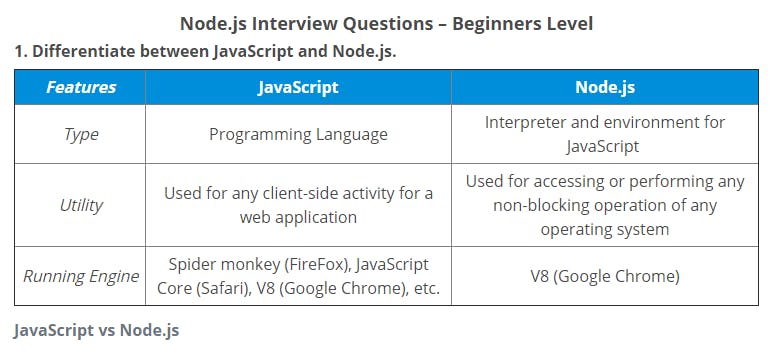
2. What Is Node.js? Node.js is an extremely powerful framework developed on Chrome’s V8 JavaScript engine that compiles the JavaScript directly into the native machine code. It is a lightweight framework used for creating server-side web applications and extends JavaScript API to offer usual server-side functionalities. It is generally used for large-scale application development, especially for video streaming sites, single page application, and other web applications.
3. List down the major benefits of using Node.js?
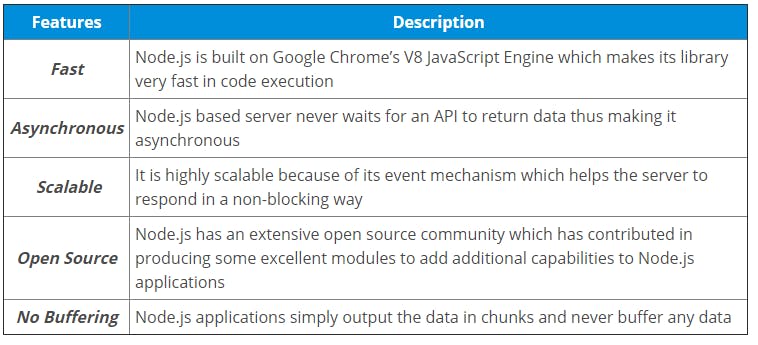
4. What is the difference between Angular and Node.js?
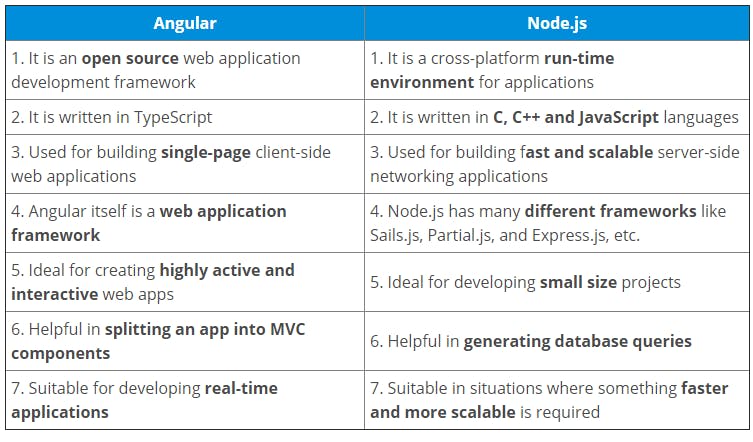
5. Why Node.js is single threaded? Node.js uses a single threaded model in order to support async processing. With async processing, an application can perform better and is more scalable under web loads. Thus, Node.js makes use of a single-threaded model approach rather than typical thread-based implementation.
6. How do Node.js works? Node.js is a virtual machine that uses JavaScript as its scripting language and runs on a v8 environment. It works on a single-threaded event loop and a non-blocking I/O which provides high rate as it can handle a higher number of concurrent requests. Also, by making use of the ‘HTTP’ module, Node.js can run on any stand-alone web server.
7. Where Node.js can be used? Node.js can be used to develop:
-Real-Time Web Applications -Network Applications -Distributed Systems -General Purpose Applications
8. How many types of API functions are there in Node.js? There are two types of API functions in Node.js:
-Asynchronous, non-blocking functions -Synchronous, blocking functions
9. What is the difference between Asynchronous and Non-blocking?
 In case you are facing any challenges with these Node.js Interview Questions, please mention your problems in the section comment section below.
In case you are facing any challenges with these Node.js Interview Questions, please mention your problems in the section comment section below.
10. What is package.json? The package.json file in Node.js is the heart of the entire application. It is basically the manifest file that contains the metadata of the project where we define the properties of a package.
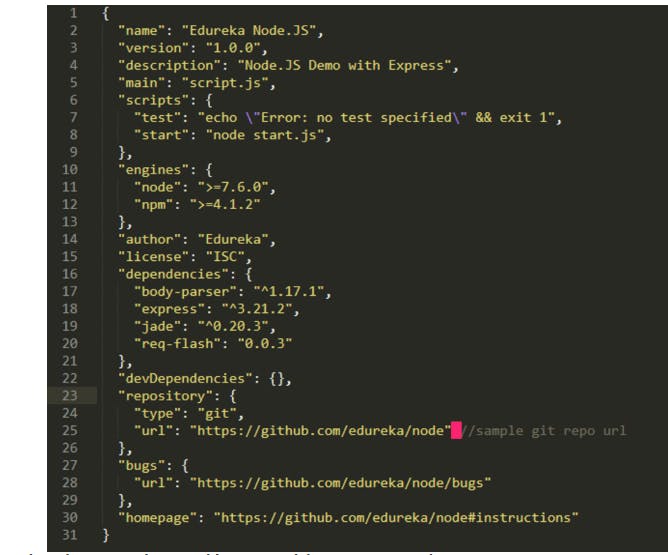
11. What do you understand by Event-driven programming? Event-driven programming is an approach that heavily makes use of events for triggering various functions. An event can be anything like a mouse click, key press, etc. When an event occurs, a call back function is executed that is already registered with the element. This approach mainly follows the publish-subscribe pattern. Because of event-driven programming, Node.js is faster when compared to other technologies.
12. What is an Event loop in Node.js and how does it work? An event loop in Node.js handles all the asynchronous callbacks in an application. It is one of the most important aspects of Node.js and the reason behind Node.js have non-blocking I/O. Since Node.js is an event-driven language, you can easily attach a listener to an event and then when the event occurs the callback will be executed by the specific listener. Whenever functions like setTimeout, http.get, and fs.readFile are called, Node.js executed the event loop and then proceeds with the further code without waiting for the output. Once the entire operation is finished, Node.js receives the output and then executes the callback function. This is why all the callback functions are placed in a queue in a loop. Once the response is received, they are executed one by one.
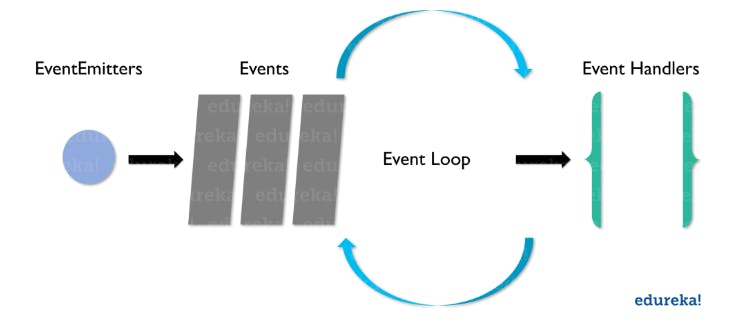 Thread Model - Node.js Interview Questions - Edureka
Thread Model - Node.js Interview Questions - Edureka
13. Explain REPL in the context of Node.js. REPL in Node.js stands for Read, Eval, Print, and Loop. It represents a computer environment such as a window console or Unix/Linux shell where any command can be entered and then the system can respond with an output. Node.js comes bundled with a REPL environment by default. REPL can perform the below-listed tasks:

-Read: Reads the user’s input, parses it into JavaScript data-structure and then stores it in the memory. -Eval: Receives and evaluates the data structure. -Print: Prints the final result. -Loop: Loops the provided command until CTRL+C is pressed twice.
14. List down the tasks which should be done asynchronously using the event loop? Below is the list of the tasks which must be done asynchronously using the event loop:
-I/O operations -Heavy computation -Anything requiring blocking
15. List down the steps using which “Control Flow” controls the function calls in Node.js?
- Control the order of execution
- Collect data
- Limit concurrency 4.Call the next step in the program
Node.js Interview Questions – Moderate Level
16. What do you understand by a test pyramid? A test pyramid basically is a diagram that describes the ratio of how many unit tests, integration tests, and end-to-end test are required to be written for the successful development of the project.test pyramid - NodeJS Interview Questions - Edureka
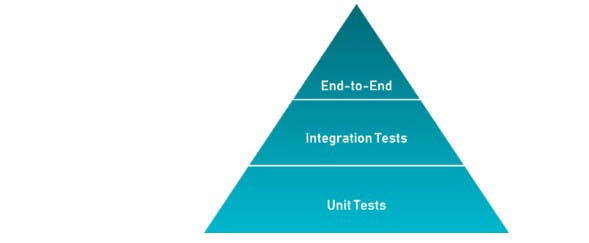
I hope this article was quite explanatory. However, follow the links at the top of the page to view other questions for Beginners, Moderate and Advance level questions.
